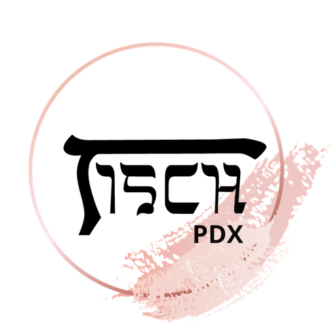Welcome to TischPDX! The mission of this newly founded organization is to revitalize Jewish communal life and practice on Portland’s East Side, by identifying and supporting the development of “Jewish start-ups” among unaffiliated Jews. We see our selves as are an emerging Jewish leadership incubator for our community.
One thing I have learned in my work as a Rabbi is that not every Jew is going to join the organized Jewish community. That is why I am delighted to be part of creating TischPDX. TischPDX seeks out Jews involved in organizing– where they are–and offers the support of regular Jewish learning and mentoring, to help emergent expressions of Judaism succeed here in Portland and in summoning the future of Judaism in the United States.
For years now, and especially since the recent rise of anti-Semitism in the U.S., East Side Portland Jews – some young, some queer, some activist, and some not so young – have sought me out for support and guidance. While I have done my best as Rabbi of Shir Tikvah to support individuals and nascent groups, those who were unaffiliated have mostly remained that way. The groups tends to avoid shul, perhaps unable to believe that a shul can be a safe place to confront their concerns about Israel, diversity, and other troubling aspects of their Jewish inheritance.
Myself, and co-founders Eleyna Fugman and Kalyn Culler-Cohen believe that these groups must be supported in their exploration by an organization that reaches out to meet them on their terms. This is part of the creating of what Rabbi Yitz Greenberg calls “Third Era Judaism.” In so doing we offer a tikkun for where our organized Judaism has become irrelevant. TischPDX cohort members see themselves clearly as Jews, even as they seek forms of that identity which are new to them and to those who observe them, but often have more in common with pre-modern Jewish identity than they know. They deserve Torah that grounds them in wisdom and roots them in the ancient so they can meaningfully explore the new and renewed. I believe that as they seek spiritual forms that nurture them, they will revitalize us all. They are the pioneers of our Jewish future, but, as Rabbi and theologian Byron Sherwin ז״ל said, “you cannot be a pioneer if you are not, first, an heir.”
Background
Portland, Oregon–the state’s largest city with two-thirds of Oregon’s population–lacks a central, ethnically Jewish neighborhood. Portland is bisected by the Willamette River, its most important geographical feature, and its downtown is on the river’s west side. This is where most Jews initially settled. In the 1960’s, a freeway was sited through the most densely settled Jewish neighborhood, which slowly destroyed it. This coincided with the American romance with the suburbs; so many of the major Jewish institutions moved to a suburb at the city’s western edge. The lack of centrally-located Jewish-identified spaces works against the deepening of Jewish identity in our city.
The river’s East Side has a more Bohemian character and attracts the young, unaffiliated, and/or queer. Although over 100 years ago Jewish organized life in Portland began on the East Side and in the downtown area, a calculated choice was made, when city development forced a decision, to move the community to the West Side. As Portland developed, the river became a factor in Jewish participation, yet as late as 2000, Portland’s established Jewish leadership saw no compelling need to locate on the East Side, believing that all those interested in furthering their Jewish connections would drive across the river. Congregation Shir Tikvah, of which I am the founding Rabbi, defied this logic and established on the East Side in 2002. Against the odds, the kehillah now numbers 180 member families.
Over the years, there have been many efforts by young and/or marginalized groups to form cohesive, Jewishly-rooted collaborations on the East Side. Over the years these have included EJCOP (Eastside Jewish Community of Portland), Mikdash, Queer Shabbat groups, alternative and pop-up minyans). We have seen these groups emerge and then fade with regularity. With the 2016 presidential election, this activity has intensified as Jews, newly targeted and suddenly vulnerable, realize anew the need to re-orient their sense of activism around their Jewish identity. Portland’s Jewish institutions have created various attempts to reach out to these young Jews, but have been challenged by several factors: the young generation’s frustration with the community’s politics around Israel, and to some extent domestic politics as well; and the distance some find natural between young adults and institutions.
Thank you for reading and please stay tuned for updates on TischPDX!
hazel hazel v’nithazek, be strong and let us strengthen each other,
Rabbi Ariel Stone

